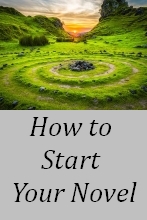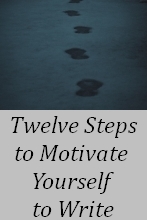Ten Things Authors Can Learn from Marathoners
By: Ken Brown
Published: 6/17/2021
Tips and Techniques to Help Your Writing
As a former marathoner and now a writer I can say, "Seriously, long distance running and writing have a lot of commonalities."

You can't train for a marathon in one day
It takes a long world view to succeed as a long distance runner. It's the same with writers, authors and novelists.
Don't go into writing thinking that you'll train for a week and then write a best seller. It's kind of a dangerous environment for indie authors.
Traditional publishers, agents and editors used to work as gatekeepers, which can be both positive or negative.
Negative for writers who have submitted ten, fifty or even one-hundred manuscripts out to multiple publishers.
Many authors got the manuscript back with a big "Rejected" written across the face of the manuscript. But then they put in the work to edit and get reader feedback and send it out again. They took classes, read books and went to conferences. They did the work over a long period of time honing their writing craft and learning how to create a book that publishers and readers wanted to read. The positive to the gatekeepers were the writers became better writers.
Indie authors don't have those gatekeepers telling them, "this far and no further." They find a cheap editor or have a family member edit their manuscript and slap a cover on it and send it to Amazon and other retailers. "Boom, look I'm published," they exclaim. That's the same as a runner thinking that running around the block a few times makes them a long distance runner, instead of putting in miles and miles of practice runs.
Today's feelings don't help you perform.
You have to work through your "feelings." I won't lie, as a long-distance runner, there were many days I wanted to say, "No More Running." I don't feel like running today. It doesn't matter, you have to push through your feelings. Writers need to sit down at the keyboard and put in the practice. It's a discipline that is hard to achieve but makes a difference whether you'll reach your writing goals.
You have to take a break to succeed
Planned breaks are important. "Wait, Ken, you just told me I have to push through those feelings of not wanting to work today and now you tell me I have to take a break to succeed. Well, which is it?" It's both. When I was training for marathons and 10K races, I had to give my body rest days. For a writer, the difference isn't letting your body rest, but letting your mind rest. You need to plan rest days, where you don't write. Or at the very least you write non-fiction instead of fiction. Let your mind take a day off. It will allow you to be more creative in the long term. Imagine if you never slept, you wouldn't be helping anybody and I think eventually you'll die.
Pace Your workouts
You can't always hit your goal for every single day, but it's not the end of the world. I had a very competitive training schedule for my marathon. It included thirty mile weeks, fifty mile weeks and even eighty mile weeks. When you're dragging on that eighty mile week because the children are sick and you aren't sleeping well, then you say, this week isn't the eighty mile week, next week is. You have to listen to your body and be smart about your writing to reach your goals.
Have a plan - Create a Writing Calendar
I created a marathon calendar. I could look at it and know that this week is the thirty mile week and I'll reach that by running three days of five milers, a ten miler on the weekend and five miles on my speed day. I could go in with knowledge of what was expected of me that day to reach my running goals. Same with a writer. How many words will you write today? Do you have a marketing day, where you don't write, but you spend your time marketing your books or creating your covers? Plan it out and put it on the calendar so when your partner asks you to go out for lunch you can point at the calendar and say, no the plan says I should be writing five-hundred words at lunch today.
Outsmart the competition
My brother, Brian, was a great runner compared to me. He ran in college and did quite well overall. I ran a race once with him and we moved to the front of the pack of leaders. I thought, great we're at the front, we can run with these guys for a while. He said, "No we go by them and make them chase us." He sped up and created distance between himself and the pack. I stayed with the pack. He won the race.
Who are you competing with as a writer? Your only competition should be your best writing self and no one else. But you have to be the leader and not let your body, friend, or well-meaning co-workers tell you what to do or when to do it.
Stick-to-it Attitude - Persistence
Think and plan for the long game. Becoming a professional author isn't a weekend task or even one month task. You have to believe you're an author and be willing to go for five years, putting your best writing on paper and getting those pages edited and published. Don't come to the game thinking that one book will make you a millionaire. The odds are NOT in your favor. How many books can you write in five years? Plan it and then stick to the plan. Then evaluate your life's position at that point. Indie authors can expect to be earning a nice income after they have written ten to twenty novels.
Plan around your life schedule
I'm talking to you people who work a full time job, take care of a family and still make time to write. When I was training for my first marathon I was training three times a day to get all my mileage in. I woke early and ran three to five miles. At lunch, I put in another three miles and then before supper, I ran the balance needed to reach my daily goal. Part-time Writers have to do the same thing. When do you have time to write? Can you find thirty minutes to an hour each morning before work? Can you skip the lunch with co-workers and spend that time writing, outlining or researching your novel? After supper or maybe after putting the little ones to bed, can you pound out another hour or two on your computer? You'd be amazed at how many words you can write even though it's not in one continuous stream of consciousness. My editor says if you have ten minutes you can do something.
Sometimes you have to go long on the weekends
You might want to work a little harder on the weekends to reach that writing goal. I planned my long runs for one of the weekend days. This required me to plan out two to four hours to run ten to twenty miles in one run. You can't know what it feels like to run pass that eighteen mile mark until you've done it a couple of times. Plan out time with your family when they will let you spend three to four hours writing without being disturbed.
Love You.
No matter how bad or good you feel you are doing at this moment, be good to yourself. I ran a ten-thousand meter (10K) race in the middle of summer. I had trained and rested appropriately before the race and I was ready. But on race day, even though I was well-trained and expected to do great and finish in the top ten or even the top five, it didn't happen. I don't know if it was the heat or lack of sleep or something else, but I had a bad race. As I came across the finish line, somewhere in the top forty, an official called out my name. Another runner who had already finished commented, "Brown, I expected you in the top ten." I replied, "Yeah, so did I, but it wasn't my day."
I didn't go into hiding for the rest of the summer. It was one bad race. I sucked it up to experience and kept training for the marathon scheduled for October. Writers will often get bad news. A beta reader doesn't like your book at all. Your editor says, "this is so bad, I'll have to charge you more." A reader posts a two star review on Amazon or Kobo and states, "I didn't realize the book was written by a grade school student. It's rubbish." You have to suck it up. Look, someone doesn't like your writing. Boo-hoo. It doesn't matter, keep writing. Maybe the person had a bad day at work or their lover left them or something that doesn't have anything to do with your book set them off, and this review allowed them to release some steam. Or sometimes, the reader doesn't even like your genre, but a friend told them they would love your book. No biggie. Take your frustration and anger out by writing more words and improving your craft.
Summary
Yes, writing multiple novels is like preparing for a marathon. You write today, tomorrow and the next day and you keep on writing. When you want to quit, because it's hard, and it is hard, you have to soldier on and push through self-doubt and fatigue and still write those five-hundred to five-thousand words you planned for that day. Do you want to be a professional writer where all your income comes from the books you publish? Then do the work. Write through the hard times and believe that if you keep doing the work you will succeed.
On a side note, I completed the 1983 Chicago marathon finishing in 247th place. Eight-thousand runners started the race and I beat most of them. I broke three-hours, which is good, but I came up short by five-minutes for the goal time I was shooting for.
I used that same committment to a goal to begin to write my first novel in 2015 and publish it in 2018. I've published two other books since then with a third waiting for time with my editor. Get the mind-set of a long distance runner and plan your writing time and stick to those times you promised yourself you would write.
Write Every Day.
Photo by Capstone Events on Unsplash.



